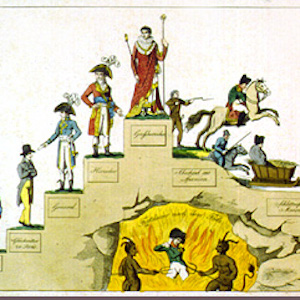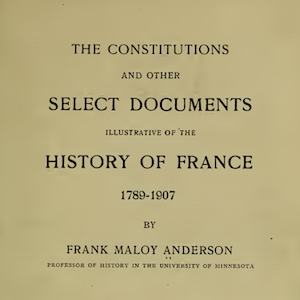Government

Departments of 1798
Map of 1798 France depicting the Departments and major urban centers.
This source is a part of the The Napoleonic Experience teaching module.

Equality
At the beginning of the French Revolution, the term "equality" meant an end to the legal differences that had characterized the Old Regime. For example, all individuals would be subject to the same regimen of taxation.

The Assassination of Marat by Charlotte Corday
In the fall of 1793, the radical journalist was confined to his bathtub by a paralyzing skin disease he had contracted while hiding from the police in the sewers. He nevertheless continued to pour out populist tracts and remained highly influential in the sections.

Robespierre 10 Thermidor—Exposition of 1877
This painting from 1877 shows in romantic style Robespierre dying in a large room, surrounded by soldiers and others.

The Blood of the Murdered Crying for Vengeance
Yet another English image promising that the death of Louis will bring havoc on the French Revolution. This engraving indicates that the very blood of the King requires vengeance.

Description of the Chouans and Other Counterrevolutionaries
The counterrevolution was a very large movement that would over time engulf different parts of France from 1793 into the Napoleonic period. But it was not one thing, for many regions of different ideologies were involved.

Progression of Napoleon’s Life
Even when they resisted Napoleon’s efforts to control their destinies, contemporaries of all European nations were fascinated by the Napoleonic legend unfolding before their eyes.

Making Peace with the Catholic Church, 1801–2
One of Napoleon’s first priorities was to reestablish good relations with the papacy, which had fought the revolutionary church settlement tooth and nail.

Bonaparte and Islam
Bonaparte’s secretary describes the religious practices, attitudes, and views of Bonaparte with regard to Islam.

In Search of Glory: Bonaparte’s Bulletins
In this passage, Bonaparte’s secretary describes the importance and effect of Bonaparte’s propaganda in the form of the military bulletin from an army in the field. Glory and military virtue were emphasized; generals vied to be included.